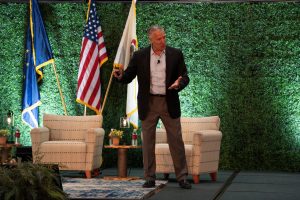Nobody gets a smooth ride.
No one knows that better than electric cooperatives.
So as Hoosier Energy marked its 75th anniversary at the 2024 Annual Meeting in French Lick, it was only fitting that the theme was Cooperative Resilience.
With all 18 member cooperatives in attendance, this meeting wasn’t merely a look back, but it was also a look ahead with the knowledge that resilience is necessary now more than ever.
MORE ANNUAL MEETING: ON 75TH ANNIVERSARY, ANNUAL MEETING STAYS FIRMLY FOCUSED ON THE FUTURE
The day’s second presentation from Brad Kitchens, ScottMadden President and CEO, was right up that alley.
A Franklin native from JCREMC territory, Kitchens took on the topic of Navigating Transformative Change.
He did so highlighting principles near and dear to cooperative hearts, all the while keeping resilience front and center.
A brief review of each decade in the 2000s highlighted significant legislation ranging from the Energy Policy Act in 2005 to the Paris Climate Agreement in 2015 to the more recent Inflation Reduction Act as well as the rapid downward trend of coal-powered generation and a focus on Distributed Energy Resources (DERs).

Brad Kitchens speaks during the 2024 Hoosier Energy Annual Meeting in French Lick.
Five key strategy issues were a good place to go next, leading off with Balancing Affordability and Reliability.
“If you focused on one over the other, you could make pretty good headway,” said Kitchens, who went on to note the inability to do so because of inflation and supply chain issues on the affordability side, then the high risk of reliability that runs through the heart of MISO territory over the next two to three years.
Next up was Grid Resilience, which included climate/weather issues (which nearly doubled in both frequency and severity) and cybersecurity.
“Resiliency is about preparing a system that can anticipate, defend against and recover quickly from difficult events,” Kitchens said.
Commitment to Decarbonization and Clean Energy was next on the list.
“We’re all committed (to the fact) it’s something we need to do and given policy, you can’t avoid it,” he said. “There’s a continuation of recognizing DERs are key to that solution – one of Hoosier’s strategic priorities. I applaud you for recognizing that and putting that center stage. Some are reluctant to do that because it’s uncomfortable, but that’s the way we’re headed.”
Kitchens’ fourth issue was Customer/Stakeholder Education and Engagement.
“A new generation of members are buying the majority of our power and their interests are different than ours might have been,” he said. “They want numbers, innovation and data managed safely and securely.”
He concluded with Talent Management/Innovation.
“There are a lot of retirements happening and making sure we have a secure and talented workforce to drive forward is critical,” Kitchens said.
He then shifted gears to noting potential Black Swan Issues. A black swan event is something rare and unpredictable, beyond what is normally expected and with potentially severe consequences. Those issues were: Business Model Disruption, Political and Regulatory Shifts, Extreme Cycle of Events, and Technology and Data Centers. The last of those might be the most concerning with business behemoths such as Amazon, Google and Microsoft wielding influence from board rooms to political parties.
One of the ways to maintain resilience in the face of those unknowns is integrated planning.
“You can’t plan areas in isolation,” Kitchens said. “You have to think across the board. That’s what is important, and you do the best you can.”
He would later wrap up his remarks by emphasizing the need to leverage the strength of the cooperative model as a key aspect of resilience.
Kitchens called the non-profit approach of cooperatives “one of the secret sauces.”
Likewise for member-driven governance. Cooperatives aren’t serving shareholders and they aren’t looking for that extra 10-20 percent profit margin of investor-owned utilities.
“There is so much strength across 18 members,” he said. “Leverage your economies of scale with talent, expertise, purchasing power, political influence and member influence.”